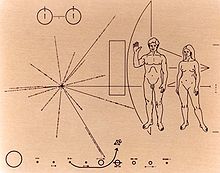Astrobiologia




Astrobiologia, olim exobiologia appellata, est campus scientificus interdisciplinarius qui origines, evolutionem primam, distributionem, futurumque vitae in universo tractat. Astrobiologia utrum vita extraterrestris exsistat an non rogat, et si exsistit, quomodo homines eam detegere possint.[2][3]
Astrobiologia disciplinis biologia moleculari, biophysica, biochemia, chemia, astronomia, cosmologia physica, exoplanetologia, geologiaque utitur ad vitam futuram in aliis mundis investigandam et biosphaeria quae a vita terrestri differre possunt agnoscenda.[4] Origo et prima vitae evolutio sunt inseparabilis disciplinae astrobiologiae pars.[5] Astrobiologia data scientifica exstantia interpretatur, et, quamquam eruditi coniecturas contextuales faciant, plerumque hypotheses quae theoriis scientificis omnino aptas tractat.
Historia et etymologia[recensere | fontem recensere]
Vocabulum astrobiologia primum Russice a Gabriele Tikhov, astronomo Russico, anno 1953 propositum est.[6] Quod nomen a Graecis ἄστρον 'stella, constellatio' + βίος 'vita' + logia 'studium' derivatur.
Aliud nomen olim in usu inter astronomos est xenobiologia ('biologia peregrinorum'), vocabulum anno 1954 a Roberto Heinlein, scriptore fictionis scientificae in mythistoria The Star Beast ('bestia stellarum') adhibitum.[7]
Aequatio Drakiana[recensere | fontem recensere]
Aestimatio numeri planetarum quibus est vita extraterrestris communicativa ex aequatione Drakiana colligi potest, aequatione quae probabilitatem vitae intellegentis ut exitus factorum sicut pars planetarum quae habitari possunt et pars planetarum ubi vita oriri potest.[8]
ubi
- N =Numerus civilizationum communicativarum
- R* = Proportio formationis stellarum vitae aptarum (stellae sicut noster sol)
- fp = Pars illarum stellarum quibus sunt planetae
- ne = Numerus mundorum magnitudinis telluris per systema planetarium
- fl = Pars illorum planetarum magnitudinis telluris ubi vita re vera oritur
- fi = Pars talium situum ubi intellegentia oritur
- fc = Pars planetarum communicativorum ubi technologia communicationis electromagneticae oritur
- L = Tempus vitae civilizationum communicantium
Nexus interni
Notae[recensere | fontem recensere]
- ↑ "Launching the Alien Debates (part 1 of 7)". Astrobiology Magazine. NASA. 8 Decembris 2006.
- ↑ "About Astrobiology". NASA Astrobiology Institute. NASA. 21 Ianuarii 2008.
- ↑ Kaufman, Marc. "A History of Astrobiology". NASA.
- ↑ Ward, P. D.; Brownlee, D. (2004). The life and death of planet Earth. New York: Owl Books. ISBN 978-0-8050-7512-0.
- ↑ "Origins of Life and Evolution of Biospheres". Journal: Origins of Life and Evolution of Biospheres.
- ↑ Cockell, Charles S. (2001). "'Astrobiology' and the ethics of new science". Interdisciplinary Science Reviews 26 (2): 90–96.
- ↑ "Xenobiology". Science 134 (3473): 223–225. 21 July 1961.
- ↑ Ford, Steve (Augustus 1995). "What is the Drake Equation?". SETI League.
Bibliographia[recensere | fontem recensere]
- Catling, David. 2013. Astrobiology: a very short introduction. Oxoniae: Oxford University Press. ISBN 9780199586455, ISBN 0199586454.
- Chyba, C. F., et K. P. Hand. 2005. "Astrobiology: The Study of the Living Universe." Annual Review of Astronomy and Astrophysics 43 (1): 31–74. doi:10.1146/annurev.astro.43.051804.102202. Bibcode 2005ARA&A..43...31C. s2cid = 2084246.
- Cockell, Charles S. 2015. Astrobiology: Understanding Life in the Universe. Nova Caesarea: Wiley-Blackwell. ISBN 978-1-118-91332-1.
- Dick, Steven J., et James E. Strick. 2004. The living universe: NASA and the development of astrobiology. Iovi Brunsvici Novae Caesareae: Rutgers University Press. ISBN 081353447X.
- Gilmour, Iain, et Mark A. Sephton. 2004. An introduction to astrobiology.Cantabrigiae: Cambridge Univ. Press. ISBN 978-0-521-83736-1.
- Goldsmith, D., et T. Owen. 2001. The Search For Life in the Universe. Ed. tertia. Addison-Wesley Publishing Company. ISBN 978-1891389160.
- Grinspoon, David. (2003) 2004. Lonely planets: The natural philosophy of alien life. Novi Eboraci: ECCO. ISBN 978-0-06-018540-4.
- Jakosky, Bruce M. 2006. Science, Society, and the Search for Life in the Universe. Tucsoniae: University of Arizona Press. ISBN 978-0-8165-2613-0.
- Kolb, Vera M., ed. 2015. Astrobiology: An Evolutionary Approach. Boca Raton Floridae: CRC Press. ISBN 978-1-4665-8461-7.
- Kolb, Vera M., ed. 2019. Handbook of Astrobiology. Boca Raton Floridae: CRC Press. ISBN 978-1-138-06512-3, ISBN 9781315159966 (eBook General), ISBN 9781351661119 (eBook Adobe Reader), ISBN 9781351661102 (eBook ePub), ISBN 9781351661096 (eBook Mobipocket).
- Lunine, Jonathan I. 2005. Astrobiology. A Multidisciplinary Approach. Franciscopoli: Pearson Addison-Wesley. ISBN 978-0-8053-8042-2.
- Mautner, Michael N. 2000. Seeding the Universe with Life: Securing Our Cosmological Future. Vasingtoniae: The Society for Life in Space. ISBN 978-0-476-00330-9. PDF.
- Ward, Peter, et Donald Brownlee. 2000. Rare Earth: Why Complex Life is Uncommon in the Universe. Novi Eboraci: Copernicus. ISBN 978-0-387-98701-9.
Nexus externi[recensere | fontem recensere]
- Astrobiology.com. Maior nuntiorum astrobiologicorum fons.
- Astrobiology. Periodicum academicum a Mary Ann Liebert, Inc., divulgatum.
- International Journal of Astrobiology. Periodicum academicum, a Cambridge University Press divulgatum.
- Astrobiology.nasa.gov.
- Centro de Astrobiología.
- Centre for Astrobiology.
- De investigatione astrobiologica. Bibliotheca Congressionalis.
- "Astrobiology Survey." Cursus academicus.
- Astrobiology Magazine: Exploring Solar System and Beyond.

